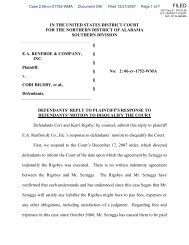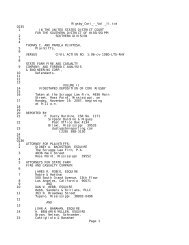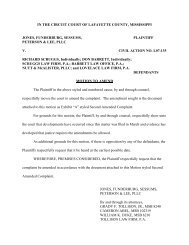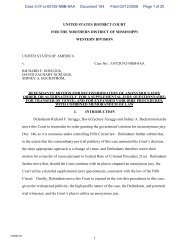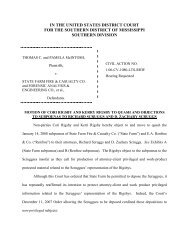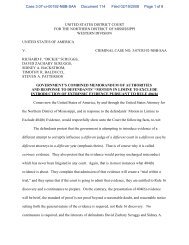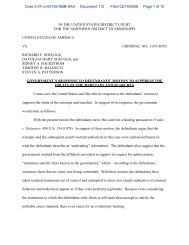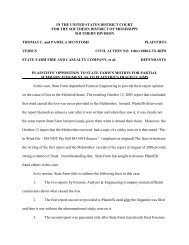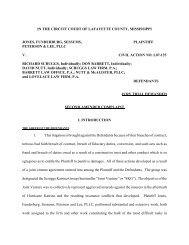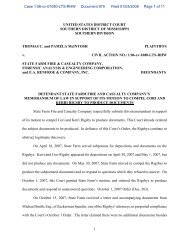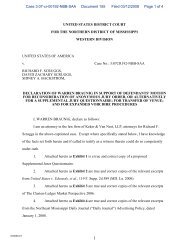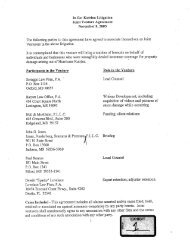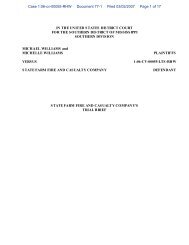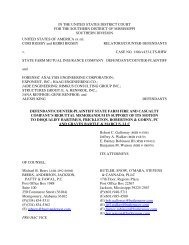Motion to Exclude 404b Testimony - Yall Politics
Motion to Exclude 404b Testimony - Yall Politics
Motion to Exclude 404b Testimony - Yall Politics
Create successful ePaper yourself
Turn your PDF publications into a flip-book with our unique Google optimized e-Paper software.
Case 3:07-cr-00192-NBB-SAA Document 93 Filed 02/11/2008 Page 4 of 16Before evidence of other crimes, wrongs, or acts may be admitted by a Court pursuant <strong>to</strong> Rule404(b): (1) the evidence must have a proper purpose under Fed. R. Evid. 404(b), that is it mustbe relevant <strong>to</strong> an issue other than the character of Defendants (e.g., identity, knowledge, or plan);(2) it must be relevant under Fed. R. Evid. 402; (3) its probative value must not be substantiallyoutweighed by the dangers of unfair prejudice, confusion of the issues, or misleading material;and (4) the Court must charge the jury <strong>to</strong> consider the evidence only for the limited purpose forwhich it is admitted. See Huddels<strong>to</strong>n v. United States, 485 U.S. 681 (1988); see also UnitedStates v. Griffin, 324 F.3d 330, 360 (5th Cir. 2003) (as amended). Further, the Court should statespecifically, prior <strong>to</strong> its decision <strong>to</strong> admit Rule 404(b) evidence, the purpose for which it isadmitting the evidence. See United States v. Youts, 229 F.3d 1312 (10th Cir. 2000).A. The only conceivable purpose for admitting the Wilson/DeLaughter extrinsicevidence pursuant <strong>to</strong> Rule 404(b) is the forbidden purpose: <strong>to</strong> suggestDefendants’ bad character.The government cannot be permitted <strong>to</strong> introduce extrinsic evidence related <strong>to</strong> the Wilsoncase <strong>to</strong> prove that Defendants have a propensity <strong>to</strong> “attempt <strong>to</strong> corruptly influence a judicialproceeding” in violation of 18 U.S.C. § 666. Rule 404(b) precludes the introduction of evidenceof uncharged wrongful acts <strong>to</strong> prove the character of a person “in order <strong>to</strong> show action inconformity therewith”, i.e., <strong>to</strong> suggest an individual’s propensity <strong>to</strong> engage in certain criminalconduct. See Old Chief v. United States, 519 U.S. 172, 181-82 (1997); United States v.Ridlehuber, 11 F.3d 516, 521 (5th Cir. 1993). Rule 404(b) “follows the venerable principle thatevidence of extrinsic offenses should not be admitted solely <strong>to</strong> demonstrate the defendant’s badcharacter,” even when the extrinsic evidence is relevant, because such evidence is inherentlyprejudicial. United States v. Beechum, 582 F.2d 898, 910 (5th Cir. 1978) (en banc).Here, the only conceivable purpose for admitting extrinsic evidence related <strong>to</strong> the Wilsoncase would be for the government <strong>to</strong> suggest Defendants’ propensity <strong>to</strong> attempt <strong>to</strong> corruptlyinfluence judicial proceedings -- that Defendants, having previously engaged in similar conduct,are the type of people who attempt <strong>to</strong> corruptly influence judicial proceedings. The introductionof this extrinsic evidence does not help the government prove any element or consequential factsin this case. It should be excluded.411044.034



